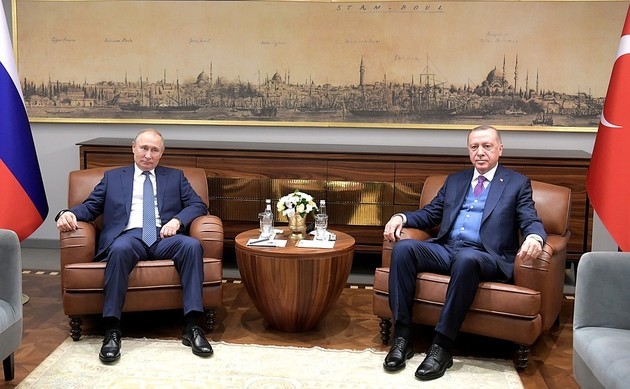In Kazakhstan, the situation is finally stabilising. President Kassym-Jomart Tokayev announced the restoration of constitutional order, and the army regained control of the Almaty airport. An active sweeping is underway in those structures that are largely to blame for the situation getting out of control. Apparently, the Kazakh president will be able to restore his power. In the meantime, we would like to draw your attention to some telegram experts who began to search for a foreign trace of Kazakhstani riots. Some claimed Russia was meddling, while others saw the British-Turkish trail.
There is no need to explain that the instability in the neighbouring country is not profitable for Russia. The very principle of the Maidan is repugnant for the Russian authorities, and the coming to power of another "velvet" politician would pose a threat to the Kremlin. In geopolitical terms, this is dangerous, since the Russian Federation has the longest border with Kazakhstan. It does not need radicals, terrorists and mass migrations. Economically, the chaos would cause a billion-dollar loss of investment.
The reasoning for Turkey is the same. Though Kazakhstan is not a member of the Turkic structures comparable to the CSTO and the Eurasian Union, but Ankara would hardly want to risk stability. Turkish business has been operating in the Caspian republic for several years. According to various estimates, the Turks are investing a billion dollars a year in numerous Kazakhstani projects. Suffice to say that the Astana airport, the Khan-Shatyr complex and the Ramada hotel were built by Turkish companies. In recent years, Kazakhstan has actively cooperated with Turkey within the framework of the Organization of Turkic States (OTS) and through the defence departments. The Kazakh servicemen are trained in Turkish military academies. Thus, organizing a coup in Kazakhstan was clearly unprofitable for Turkey. Why arrange dangerous geopolitical actions when everything is fine?
We should also mention the theory that Turkey is shaking Central Asia at London’s request. Turkey has good relations with many Turkic-speaking countries, and there is no need to perform provocations there at the behest of MI6. The same theories were heard during the Second Karabakh War when pseudo-experts argued that Great Britain was meddling actively. As if without Britain, Turkey ignored Azerbaijan’s problems. As a result, exactly Russia and Turkey strengthened their positions in the South Caucasus by creating a joint monitoring centre, while Britain and the rest of the NATO countries were left out of business.
Though for Great Britain, the destabilization of Kazakhstan is not profitable as well. After all, the British oil companies Royall Dutch Shell and British Gas invested huge amounts of money in the production of Kazakhstani oil. And, judging by the official statements, neither Ankara nor London supported the protesters. Erdogan and the British Prime Minister did not demand the resignation of the authorities, as it was in Syria. The theory about competition between Turkey and Russia and Ankara's desire to squeeze Moscow out of Central Asia and create "Great Turan" is very speculative.
The membership in the CSTO and the EAEU de facto did not restrict Kazakhstan. Both Nursultan Nazarbayev and Kassym-Zhomart Tokayev pursued a multi-vector foreign policy, cooperating with Turkey, China, and the Western countries. Moreover, Russian and Turkish businesses cooperate in Kazakhstan. In 2015, at the Astana Forum, a Sberbank subsidiary agreed with the local authorities on financing Turkish projects, and a representative of Sberbank claimed that 30% of trade transactions between Turkey and Kazakhstan are carried out by a Russian bank. It is planned to increase this figure to 50%. In addition, Russia and Turkey are coordinating their efforts on foreign policy issues. Telephone conversations between Putin and Erdogan amid the crisis indicate that there is an understanding between the two countries regarding the situation in Kazakhstan.
It should be noted that the Kazakh authorities have always played a strengthening role in Russian-Turkish relations. Nazarbayev, along with Azerbaijani President Ilham Aliyev, worked on reconciliation between Moscow and Ankara after the Russian Su-24 was shot down in 2015. In addition, the meetings on Syria with the participation of Russia and Turkey were held in the Kazakh capital, hence the name of the trilateral format (Russia, Turkey, Iran) - the Astana peace process.
Russia and Turkey have been feeling very comfortable in Central Asia under the first and second presidents of Kazakhstan. Of course, the introduction of the CSTO troops and, in fact, the rescue of Tokayev by Vladimir Putin will strengthen the coordination of Nur-Sultan and Moscow. However, this does not mean that Kazakhstan will certainly break ties with Turkey. That is why a ministerial meeting of the Turkic-speaking countries will be held the day after the CSTO summit. Such a schedule suggests that Russia will remain a priority for Kazakhstan as an ally, and that stability in the republic largely depends on it. At the same time, after strengthening his positions, Tokayev will certainly try to maintain contact with other beneficial external partners, including the Republic of Turkey.






